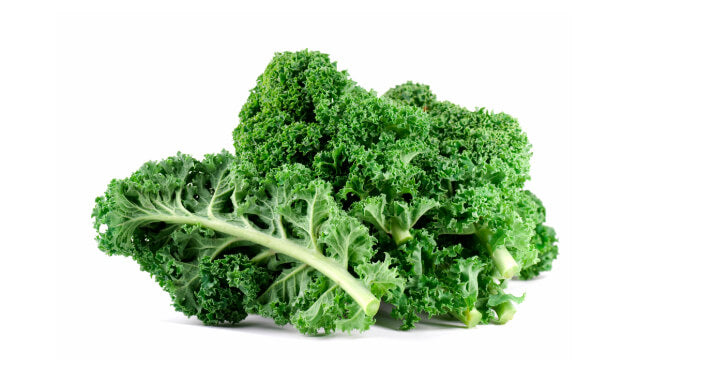This is a leafy green that is probably no stranger to you now. Kale has had its many moments in the health spotlight. You may think you know all there is to know about this leaf cabbage, but we are willing to bet that we might be able to astonish you with a few more facts about the health benefits of kale! There’s so much nutrition in plant-based foods and discoveries of the health benefits of foods like kale are still ongoing!
What is Kale?
Kale or leaf cabbage belongs to a group of cabbage (Brassica Oleracea) cultivars grown for their edible leaves. Kale can have bright or dark green or even purple leaves and the central leaves do not form a head like the traditional cabbages you may be familiar with. Kale’s considered to be closest to wild cabbage than most of its more familiar, domesticated forms.
Nutrients Found in Kale
This cruciferous vegetable is among the most nutrient-dense foods on the entire planet, so now you know the reason why so many people are still going crazy for kale. The most common kinds of kale you will see is called curly kale or Scots kale. 1 cup of raw kale (about 67 grams, or 2.4 ounces) contains:
- 206% of the daily value of vitamin A
- 684% of the DV of vitamin K
- 134% of the DV of vitamin C
- 9% of the DV of Vitamin B6
- 26% of the DV of Manganese
- 9% of the DV of Calcium
- 10% of the DV of Copper
- 9% of the DV of Potassium
- 6% of the DV of Magnesium
Kale also contains at least 3% or more of the DV for vitamin B1, vitamin B2, vitamin B3, iron, and phosphorus. And 1 cup of raw kale has a total of just 33 calories, 6 grams of carbs where 2 grams are from fiber, and 3 grams of protein.
Kale is Loaded with Antioxidants
Like many leafy greens, kale is extremely high in antioxidants. These antioxidants include beta-carotene and vitamin C, as well as various flavonoids and polyphenols. (1)Antioxidants help counteract the oxidative damages done to our bodies by free radicals, a by-product of metabolism (oxidation). Oxidative stress can cause damage to your DNA and other crucial molecules in your body. (2) Oxidative stress is also believed to be one of the leading causes of gaining and perhaps the cause of many diseases, including cancer. (3)
There is far more to kale however than just antioxidants. You will find the large amounts of flavonoids quercetin and kaempferol in kale. These two substances have been featured in many studies including test tubes and animal studies and are believed to have a powerful heart-protective effect, may lower blood pressure, as well as have an anti-inflammatory, anti-viral, anti-depressant, and anti-cancer effect. Just to name a few! (4, 5, 6)
Another Excellent Source of Vitamin C
Another important water-soluble antioxidant is vitamin C, which serves many vital functions for our body’s cells. Kale is a superb source for it. Vitamin C, for example, helps with the synthesis of collagen, the most abundant structural protein in our entire body. Kale is also much higher in vitamin C than most other vegetables and is one of the world’s best sources of it. One cup of raw kale contains more vitamin C than an entire orange!
One of the Best Sources for Vitamin K
Vitamin K is an important nutrient that is critical for blood clotting. Vitamin K can do this by activating certain proteins and giving them the means to bind calcium. One single cup of raw kale contains almost 7 times the recommended daily amount of vitamin K.
Cancer-Fighting Properties
Cancer is a terrible disease. It is a name given to a collection of related diseases, but in all types of cancer, some of the body’s cells begin to divide without stopping then spreading into surrounding areas. It can start almost anywhere in the body which is made up of trillions of cells.
Kale, however, comes loaded with compounds that are now believed to have protective effects against cancer. One such compound, sulforaphane, is a substance that has been shown to help fight the formation of cancer at the molecular level. (7) In addition to sulforaphane, kale also contains indole-3-carbinol, yet another substance that is believed to help prevent cancer. (8)
Other studies have shown that cruciferous vegetables, of which kale is included, may also significantly lower the risk of several cancers, although the evidence in humans is still mixed. (9)
Other Amazing Health Benefits of Kale Include:
- High in beta-carotene, which is an antioxidant your body can turn into vitamin A.
- A fantastic source of minerals that most of us do not get enough of.
- Kale is high in lutein and Zeaxanthin, nutrients that protect the eyes.
Is it any wonder we include super-food greens like kale in many of our recipes and supplements? The health benefits of kale are astounding, simply making it a perfect raw-plant food choice in your diet. If you want to learn more about amazing plants, check out our section of educational resources and resource center for more eye-opening facts, information, and more!
- Composition and antioxidant activity of kale, raw, and cooked: https://pubmed.ncbi.nlm.nih.gov/22744944/
- Oxidative stress, prooxidants, and antioxidants: the interplay. https://pubmed.ncbi.nlm.nih.gov/24587990/
- Antioxidants and human diseases: https://www.sciencedirect.com/science/article/abs/pii/S0009898114002629
- Chemistry and biological activities of flavonoids: an overview https://pubmed.ncbi.nlm.nih.gov/24470791/
- Therapeutic potential of quercetin to decrease blood pressure: a review of efficacy and mechanisms: https://pubmed.ncbi.nlm.nih.gov/22332099/
- A review on the dietary flavonoid kaempferol: https://pubmed.ncbi.nlm.nih.gov/21428901/
- Sulforaphane as a Promising Molecule for Fighting Cancer: https://link.springer.com/chapter/10.1007%2F978-3-642-38007-5_12
- Attenuation of Carcinogenesis and the Mechanism Underlying by the Influence of Indole-3-carbinol and Its Metabolite 3,3’ – Diindolylmethane: A Therapeutic Marvel https://link.springer.com/chapter/10.1007%2F978-3-642-38007-5_12
- Cruciferous vegetables and human cancer risk: epidemiologic evidence and mechanistic basis: https://pubmed.ncbi.nlm.nih.gov/17317210/








1 comment
Verna Freshley
Thank you for the interesting article about kale. I did not know it had all of those things included. I knew it was good, but not that good. Thank you.
Thank you for the interesting article about kale. I did not know it had all of those things included. I knew it was good, but not that good. Thank you.